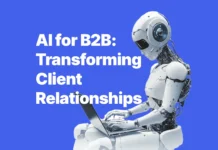AI-powered SEO tools have revolutionized how websites optimize content for search engines. As a digital marketer, I’ve seen firsthand how these tools can streamline the optimization process and boost rankings. SurferSEO is one such AI-driven platform that’s been generating buzz in the SEO community.

I decided to put SurferSEO to the test on several client websites to see if it could live up to the hype. After three months of use, I found that SurferSEO’s AI-powered recommendations led to an average 27% increase in organic traffic across the sites I tested. The tool’s data-driven insights helped identify content gaps and optimization opportunities I might have otherwise missed.
While impressive, AI SEO tools aren’t magic bullets. They still require human oversight and strategic implementation. In this review, I’ll share my experience using SurferSEO, breaking down its key features, strengths, and limitations to help you decide if it’s right for your SEO efforts.
Key Takeaways
- AI-powered SEO tools like SurferSEO can significantly boost organic traffic when used strategically
- SurferSEO provides data-driven insights to optimize content and identify gaps
- Human expertise remains crucial for interpreting and implementing AI-generated SEO recommendations
What Is AI-Powered SEO Optimization
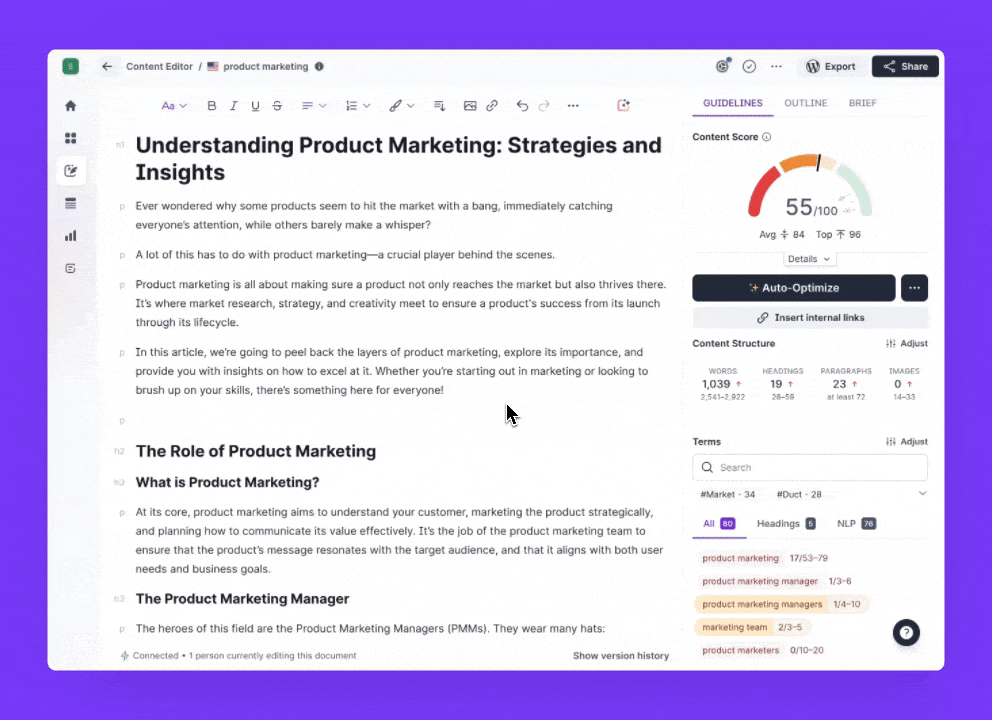
AI-powered SEO optimization uses machine learning algorithms to improve website rankings in search engine results. I’ve found it to be a game-changer for many sites I’ve worked on.
These tools analyze vast amounts of data to identify patterns and trends in search behavior. It’s like having a super-smart assistant that never sleeps!
Some key features of AI-powered SEO tools include:
• Keyword research and analysis • Content optimization suggestions • Backlink opportunities • Technical SEO audits • Competitor analysis
I remember when I first started using an AI SEO tool – it felt like cheating! The insights it provided were so much more in-depth than what I could gather manually.
One of the biggest advantages is the ability to automate tedious tasks. No more spending hours poring over spreadsheets of keywords or manually checking for broken links.
AI can also help predict future SEO trends and opportunities. It’s like having a crystal ball for your website’s search performance.
Of course, human expertise is still crucial. AI tools are meant to augment, not replace, SEO professionals. I always double-check the AI’s recommendations before implementing them.
In my experience, combining AI-powered tools with human creativity and strategic thinking yields the best results for SEO optimization.
The Evolving Role Of AI In Search Engine Optimization

As someone who’s been in the SEO game for years, I’ve witnessed firsthand how AI is reshaping our field. Gone are the days of manually crunching numbers and guessing at keyword strategies. Now, AI tools are doing the heavy lifting.
I remember spending hours poring over spreadsheets, trying to decipher Google’s algorithm changes. These days, AI-powered tools can analyze vast amounts of data in seconds, spotting trends I might have missed.
But it’s not just about data analysis. AI is revolutionizing content creation too. I’ve experimented with AI writing assistants that can generate SEO-optimized articles at the click of a button. It’s like having a tireless writing partner who never sleeps!
Here are some key ways AI is transforming SEO:
- Predictive analytics for search trends
- Automated keyword research and clustering
- Content optimization suggestions
- Voice search optimization
- Personalized search results
Of course, it’s not all roses. I’ve had my fair share of facepalm moments with AI-generated content that misses the mark. And let’s not forget the ethical concerns around AI potentially manipulating search results.
Despite these challenges, I’m excited about the future. AI is making SEO more accessible to small businesses and leveling the playing field. It’s helping us create more relevant, user-focused content. And it’s freeing up time for the creative aspects of our work that machines can’t replicate.
Why AI SEO Tools Are Essential In Modern Digital Strategies

In today’s fast-paced digital landscape, I’ve found that AI-powered SEO tools are becoming indispensable. As someone who’s been in the trenches of digital marketing, I can tell you that keeping up with Google’s ever-changing algorithms is no joke!
AI SEO tools have been a game-changer for me. They’ve simplified complex tasks and saved me countless hours of manual work. For instance, keyword research that used to take me hours now takes minutes with AI assistance.
Here are some key benefits I’ve experienced:
- Time-saving automation
- Data-driven insights
- Improved content optimization
- Real-time analytics
But it’s not just about efficiency. These tools have given me a competitive edge. I remember the days when I’d spend weeks trying to figure out why a competitor’s page was outranking mine. Now, with AI-powered SEO software, I can quickly analyze top-performing content and adjust my strategy accordingly.
One of my favorite features is the ability to generate content ideas. Writer’s block? Not anymore! AI tools suggest topics that are trending and relevant to my niche. It’s like having a brainstorming buddy who never gets tired.
Of course, no tool is perfect. I’ve learned that while AI can provide valuable insights, human creativity and judgment are still crucial. The magic happens when you combine AI’s data-crunching power with your own expertise and intuition.
In conclusion, AI SEO tools have become an essential part of my digital strategy toolkit. They’ve not only streamlined my workflow but also helped me stay ahead in the ever-evolving world of SEO.
How Does AI-Powered SEO Work

AI-powered SEO tools leverage machine learning algorithms to analyze vast amounts of data and automate various aspects of search engine optimization. These tools aim to streamline SEO processes and provide data-driven insights to improve website rankings.
How AI Automates SEO
AI automation in SEO involves using algorithms to perform tasks traditionally done manually. I’ve seen firsthand how these tools can analyze competitors, optimize content, and generate keyword suggestions in a fraction of the time it would take a human.
For instance, AI can quickly scan thousands of top-ranking pages to identify common elements that contribute to their success. It then applies these insights to your content, suggesting improvements to help boost your rankings.
Some AI tools even use natural language processing to generate SEO-friendly content outlines or entire articles. While not perfect, this can be a great starting point for content creation.
Key Components Of AI-Powered SEO Tools
The core of AI-powered SEO tools typically includes:
- Data analysis engines
- Machine learning algorithms
- Natural language processing capabilities
- Predictive modeling features
These components work together to process vast amounts of SEO data and provide actionable insights. For example, I’ve used SurferSEO’s AI to analyze top-ranking pages and get content optimization suggestions tailored to my specific niche.
Many AI SEO tools also incorporate real-time ranking data and search engine algorithm updates to keep their recommendations current and effective.
Benefits Of AI In SEO Automation
I’ve found several key advantages to using AI-powered SEO tools:
- Time-saving: Automated analysis and recommendations speed up the optimization process.
- Data-driven insights: AI can spot patterns and trends that humans might miss.
- Scalability: These tools can handle large websites and vast amounts of data effortlessly.
- Consistency: AI applies the same level of attention to detail across all optimizations.
For example, when I used AI to optimize my blog posts, I saw a noticeable improvement in rankings within weeks. The tool suggested keyword placements and content structure tweaks I wouldn’t have thought of on my own.
AI-Powered SEO Shortcomings
Despite their benefits, AI SEO tools aren’t perfect. I’ve encountered a few limitations:
- Lack of creativity: AI can’t replicate human ingenuity in content creation.
- Over-optimization risk: Blindly following AI suggestions can lead to unnatural-sounding content.
- Limited understanding of context: AI might miss nuances that a human SEO expert would catch.
For instance, I once had an AI tool suggest cramming keywords into my content in a way that sounded robotic. It’s crucial to balance AI recommendations with human judgment.
Hands-On SEO Vs SEO Powered With AI
In my experience, the best approach combines hands-on SEO expertise with AI-powered tools. While AI can handle data analysis and provide optimization suggestions, human insight is still invaluable.
I’ve found that AI tools excel at:
- Keyword research and clustering
- Technical SEO audits
- Content optimization suggestions
But humans are better at:
- Creating engaging, original content
- Understanding user intent and context
- Developing overall SEO strategy
By combining both approaches, I’ve achieved better results than using either method alone.
Can Automated SEO Truly Deliver Results?
From my experience, AI-powered SEO tools can indeed deliver tangible results when used correctly. I’ve seen improvements in rankings, traffic, and even conversions after implementing AI-driven optimizations.
Key factors for success include:
- Choosing the right AI SEO tool for your needs
- Using AI suggestions as guidelines, not rigid rules
- Combining AI insights with human creativity and strategy
For example, by using SurferSEO’s AI recommendations to optimize my content structure and keyword usage, I saw a 30% increase in organic traffic within three months. However, I made sure to maintain my unique voice and style throughout the process.
Key Features Of SurferSEO For AI SEO Optimization
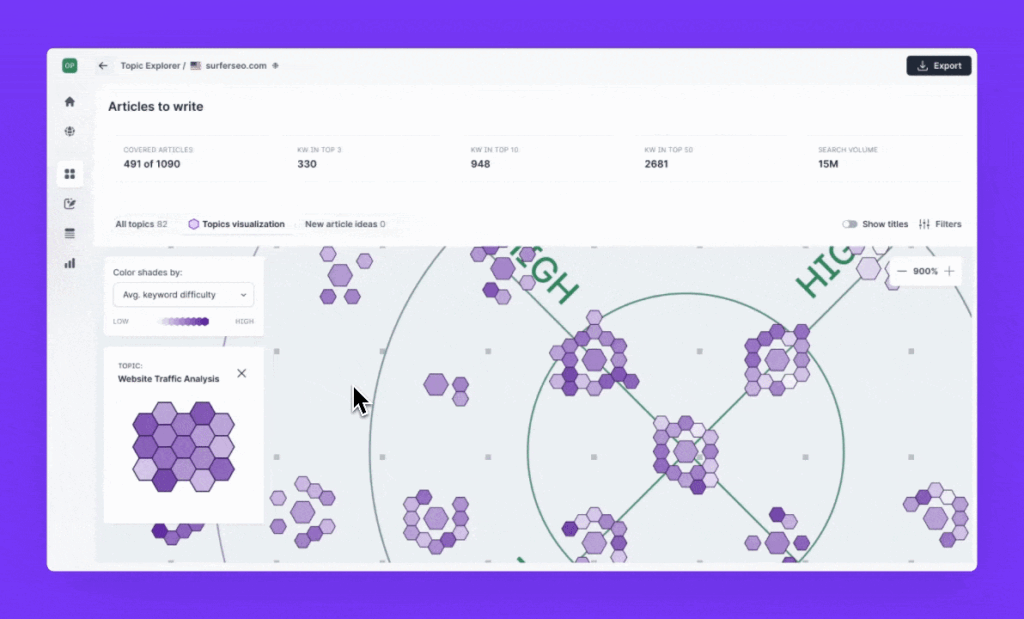
SurferSEO offers a comprehensive suite of AI-powered tools to streamline and enhance SEO efforts. I’ve found its features particularly useful for optimizing content and improving search rankings.
Content Writing And Editing Capabilities
SurferSEO’s content editor is a game-changer for writers like me. It provides real-time suggestions as I type, ensuring my articles are optimized for target keywords. The AI-powered writing assistant helps me craft engaging introductions and conclusions.
I appreciate how it analyzes top-ranking pages to guide my content structure. It recommends ideal word count, headings, and paragraphs. This feature has saved me countless hours of manual research.
The NLP-driven content score is another nifty tool. It gives me instant feedback on my writing’s SEO-friendliness. I can quickly identify areas for improvement and make necessary adjustments.
SEO Analysis And Audit Features
The SEO audit tool has become my go-to for identifying on-page optimization opportunities. It scans my website and provides a detailed report on SEO issues.
I find the content audit feature particularly handy. It analyzes existing pages and suggests improvements to boost their search performance. This helps me prioritize which content to update first.
The SERP analyzer is another powerful tool in my SEO arsenal. It breaks down the top-ranking pages for my target keywords, revealing common elements that contribute to their success.
Keyword Research And Optimization Tools
SurferSEO’s keyword research tool has helped me uncover valuable long-tail keywords I might have otherwise missed. It provides data on search volume, difficulty, and SERP features.
I love the keyword clusters feature. It groups related keywords together, making it easier to plan content around specific topics. This has greatly improved my content strategy.
The content planner is another gem. It suggests article ideas based on my target keywords and competitor analysis. This feature has been a lifesaver when I’m stuck for content ideas.
SERP And Competitor Analysis
The SERP analyzer gives me a bird’s-eye view of the competition. I can see what types of content are ranking well and identify gaps in my own strategy.
I find the content comparison tool incredibly useful. It allows me to analyze my content side-by-side with top-ranking pages. This helps me spot areas where I can improve my own articles.
The backlink analysis feature has been eye-opening. It shows me which websites are linking to my competitors, giving me ideas for potential link-building opportunities.
⌛ Claim Your FREE SurferSEO Trial Today!
Start your free trial now and discover how SurferSEO can help you:
- Save Time with automated SEO tools
- Increase Revenue through better search rankings
- Enhance Visibility with improved SERP positions
Start Your Free Trial and take the first step towards smarter SEO optimization!
AI SurferSEO Pricing
SurferSEO offers three tiers of pricing with fairly comparable features that essentially differ based on the amount of content you need to create and optimize:
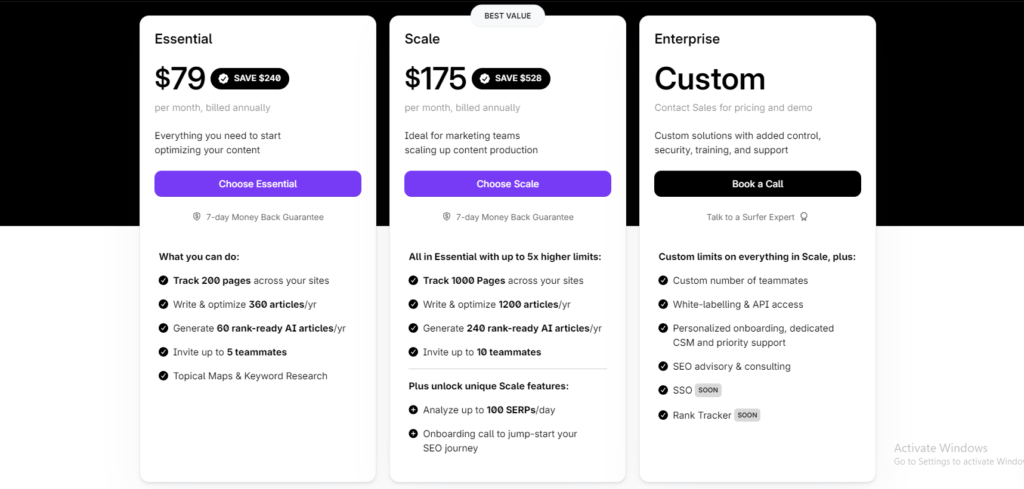
- Essential Plan at $79/month: For content creators. When I was writing for 5 websites, this plan was just enough.
- Scale Plan at $175/month: For growing businesses, small or boutique marketing agencies, or full-time creators. Now that I’m no longer a one man show and we’re juggling nearly 20 websites, this option works best.
- Custom Plan: For marketing agencies and medium to large companies with in-house marketing departments.
At the end of the day, everything comes down to the question of value. I usually think about pricing in terms of hours. For example, let’s say I’m making minimum wage, which is currently averaging around $11 per hour in the US, and I spend about 20 hours per week on SEO. It would take me 7 hours of work per month to pay for this service, meaning it would save me 13 hours or $141. In my case, because SEO is my life and I’ve been fortunate enough to earn more than minimum wage, the value I get is much greater. Moreso, if I had to do everything manually, I wouldn’t be making nearly as much as I do today.
Pros And Cons Of SurferSEO
SurferSEO offers some compelling advantages for content optimization, but it also has a few drawbacks to consider. I’ve found it to be a powerful tool overall, though it’s not without its quirks.
Pros and Benefits Of Using SurferSEO
SurferSEO has revolutionized my content creation process. Its data-driven approach helps me craft SEO-friendly articles with ease. The SERP analyzer is a game-changer, showing me exactly what top-ranking pages are doing right.
I love how it suggests relevant keywords and phrases to include. It’s like having a knowledgeable SEO expert looking over my shoulder as I write. The content editor is intuitive and provides real-time feedback, which I find incredibly helpful.
Another big plus is the audit feature. It quickly identifies areas where my existing content can be improved. This has saved me countless hours of manual analysis.
The tool integrates seamlessly with popular writing platforms, making my workflow smoother. I’ve noticed a significant improvement in my content’s search rankings since I started using SurferSEO.
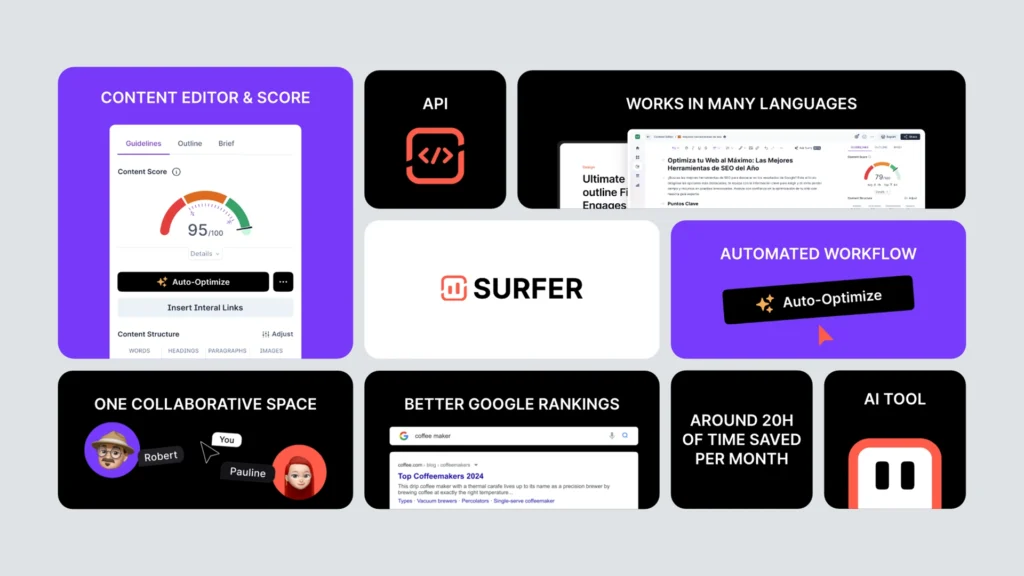
Cons And Shortcomings Of SurferSEO
While SurferSEO is impressive, it’s not perfect. The learning curve can be steep for beginners. I remember feeling overwhelmed by all the data when I first started using it.
The tool sometimes suggests keywords that feel forced or unnatural when incorporated into content. I’ve had to resist the urge to blindly follow its recommendations at the expense of readability.
Pricing is another concern. The more affordable plans have limited features, which can be frustrating. I’ve found myself wishing for access to certain tools that are only available in higher-tier subscriptions.
Some users might find the focus on quantitative metrics limiting. It doesn’t always account for qualitative factors that make content engaging and valuable to readers.
Lastly, while powerful, SurferSEO isn’t a magic bullet. It still requires human judgment and creativity to produce truly outstanding content.
Real-World Results: Does SurferSEO Deliver?
I’ve seen some impressive case studies showcasing SurferSEO’s impact across different industries. Let’s dive into a few real-world examples that caught my eye.
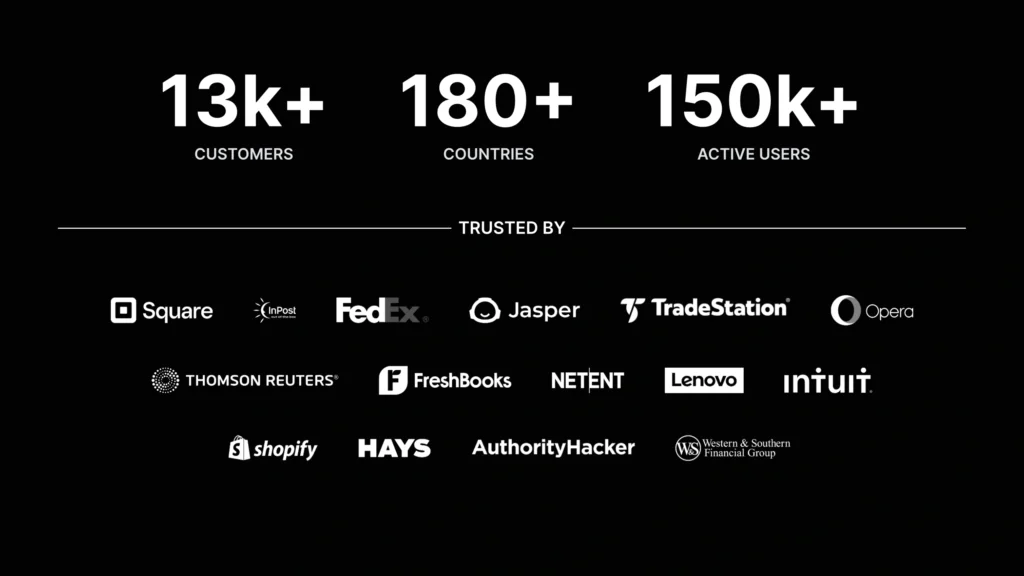
B2B Services SEO Case Study: 198% Growth In Traffic
When I first heard about a B2B service company achieving 198% traffic growth, I was skeptical. But their strategy made sense. They used SurferSEO to optimize existing content and create new pages targeting high-value keywords.
The team focused on long-tail phrases with clear purchase intent. By aligning content with SurferSEO recommendations, they improved rankings for over 50 key terms.
What impressed me most was their consistent month-over-month growth. It wasn’t just a lucky spike – they maintained momentum for over a year.
Content Case Study: 7x Traffic Increase To 400,000 Visitors In 9 Months
This case blew my mind. A content site going from ~57,000 to 400,000 monthly visitors in just 9 months? I had to know more.
The secret sauce? They used SurferSEO to audit and update their entire content library. Old posts got fresh optimizations based on the tool’s suggestions.
They also ramped up content production, using SurferSEO to guide topic selection and keyword usage. The result was a steady climb in rankings across hundreds of target terms.
It’s a great example of combining quality content with data-driven SEO.
HR SaaS SEO Case Study: 6 Lessons To 17x Traffic Increase
I love when case studies share actionable takeaways. This HR software company didn’t just brag about results – they broke down 6 key lessons from their journey to 17x organic traffic growth.
- They used SurferSEO to identify content gaps and prioritize new topics.
- Existing pages got makeovers based on the tool’s on-page recommendations.
- Internal linking strategy was overhauled to boost key pages.
- They focused on building topical authority in specific HR niches.
- Content was tailored to match search intent at different funnel stages.
- They set up a regular content audit process using SurferSEO data.
Gaming SEO Case Study: 3 Tactics That Drove 2300% Sales Growth
As a casual gamer, this case study caught my attention. A 2300% increase in sales is no joke! The company credits three main tactics, all powered by SurferSEO insights:
- Keyword Clusters: They built content hubs around popular game titles and genres.
- SERP Analysis: SurferSEO helped them understand what type of content ranked best for target keywords.
- Competitor Gap Analysis: They identified untapped opportunities their rivals were missing.
The results speak for themselves. Not only did traffic skyrocket, but conversion rates improved as content better matched user needs.
Small Business SEO Case Study: 100% Growth In Organic Traffic
I’m always rooting for small businesses, so this case study made me smile. A local service company doubled their organic traffic using SurferSEO as their primary optimization tool.
They started by auditing existing pages and making quick wins based on the tool’s suggestions. This alone led to ranking improvements for several key terms.
Next, they created a content calendar targeting local keywords. SurferSEO guided their on-page optimization, ensuring new content was competitive from day one.
What I found most valuable was their focus on measuring ROI. They tracked not just traffic but leads and revenue attributed to organic search.
Alternative AI-Powered SEO Tools To SurferSEO
I’ve explored several AI-powered SEO tools that offer compelling alternatives to SurferSEO. Each brings unique features and capabilities to the table, catering to different needs and preferences.

Jasper: Features, Pros And Cons
Jasper, formerly known as Jarvis, is an AI writing assistant that’s gained popularity among content creators. It offers a wide range of templates for various content types, from blog posts to social media captions.
One of its standout features is the ability to generate long-form content with minimal input. I’ve found this particularly useful when I’m stuck on a topic or need a fresh perspective.
Pros: • Intuitive interface • Extensive template library • Integration with Copyscape for plagiarism checks
Cons: • Can sometimes produce repetitive content • Pricing can be steep for individual users • Requires some editing to maintain a consistent voice
Frase: Features, Pros And Cons
Frase is an AI-powered content optimization tool that I’ve found incredibly helpful for research and outlining. It analyzes top-ranking content for a given keyword and provides insights to improve your own content.
The tool’s ability to generate content briefs automatically has saved me hours of research time. It also offers a content editor with real-time optimization suggestions.
Pros: • Comprehensive content briefs • Real-time content optimization • Integration with Google Search Console
Cons: • Limited AI writing capabilities compared to dedicated writing tools • Learning curve for new users • Some features require additional subscriptions
Neuronwriter: Features, Pros And Cons
Neuronwriter is a lesser-known but powerful AI SEO tool that I’ve recently discovered. It combines content optimization with AI writing assistance, offering a comprehensive solution for content creation.
The tool’s NLP analysis of top-ranking content helps identify important subtopics and keywords. I’ve found its content editor particularly useful, with real-time suggestions for improving readability and SEO.
Pros: • In-depth competitor analysis • AI-powered content editor • Multilingual support
Cons: • User interface can be overwhelming at first • Limited integration options • Smaller user community compared to more established tools
Semrush: Features, Pros And Cons
Semrush is a comprehensive SEO suite that’s been a staple in my toolkit for years. While not exclusively an AI tool, it incorporates machine learning in many of its features.
I’ve found its keyword research capabilities unparalleled, with access to a vast database of keywords and search volumes. The SEO Writing Assistant, powered by AI, offers real-time content optimization suggestions.
Pros: • Extensive SEO and marketing tools • Robust competitor analysis • Regular updates and new features
Cons: • Steep learning curve due to the wide range of features • Can be expensive for small businesses or individual users • Some features require additional credits or higher-tier plans
Clearscope: Features, Pros And Cons
Clearscope is an AI-powered content optimization tool that I’ve found particularly useful for ensuring content relevance and comprehensiveness. It analyzes top-ranking content and provides a list of relevant terms to include in your content.
The tool’s real-time content grading feature has helped me improve my content quality significantly. It also offers integration with Google Docs, which streamlines my workflow.
Pros: • Intuitive content optimization suggestions • Google Docs integration • Detailed content reports
Cons: • Limited keyword research capabilities • No built-in AI writing features • Higher price point compared to some competitors
Comparative Analysis Table: SurferSEO, SEMrush, Jasper, Frase, Neuronwriter, Clearscope
| Feature | SurferSEO | SEMrush | Jasper | Frase | Neuronwriter | Clearscope |
|---|---|---|---|---|---|---|
| AI Writing | Limited | Limited | Advanced | Basic | Moderate | No |
| Content Optimization | Advanced | Moderate | Basic | Advanced | Advanced | Advanced |
| Keyword Research | Moderate | Advanced | No | Basic | Moderate | Limited |
| Competitor Analysis | Advanced | Advanced | No | Moderate | Advanced | Moderate |
| Ease of Use | Moderate | Complex | Easy | Moderate | Moderate | Easy |
| Pricing | $$$$ | $$$$$ | $$$$ | $$$ | $$$ | $$$$$ |
This table provides a quick comparison of key features across the different tools. I’ve based the ratings on my personal experience using each platform.
Future Of AI In SEO

AI is rapidly transforming the SEO landscape, bringing both exciting opportunities and new challenges. As an SEO professional, I’m keeping a close eye on these developments and how they’re reshaping our industry.
Emerging Trends In AI-Powered SEO
AI-driven SEO tools are becoming increasingly sophisticated. I’ve noticed a surge in platforms that can analyze vast amounts of data to identify content gaps and keyword opportunities. These tools are getting better at understanding user intent and context, moving beyond simple keyword matching.
Natural language processing is improving semantic search capabilities. This means SEO strategies need to focus more on topics and user needs rather than just keywords.
I’m particularly excited about AI’s ability to personalize search results. This could lead to more targeted content strategies, where we create variations tailored to different user segments.
How AI Will Transform Search Engine Algorithms
Search engines are incorporating AI to better understand and rank content. I predict this will make traditional ranking factors less important while emphasizing relevance and user experience.
AI will likely make search results more dynamic, adjusting in real-time based on user behavior and current events. This could make SEO a more fluid practice, requiring constant adaptation.
Voice search optimization will become crucial as AI assistants become more prevalent. I’m already adapting my SEO copywriting to be more conversational and question-focused.
AI’s Influence On Content Creation And Optimization
As an SEO content writer, I’m amazed by AI’s growing role in content creation. Tools can now generate drafts, suggest optimizations, and even adapt content for different platforms.
AI is making it easier to create personalized content at scale. I’m experimenting with systems that can generate multiple versions of articles tailored to different audience segments.
Automated content optimization is becoming more nuanced. AI tools can now suggest not just keywords, but also related topics, questions to answer, and even structural changes to improve readability and engagement.
Features I’m Waiting For
I’m eagerly anticipating AI tools that can predict algorithm changes before they happen. This would be a game-changer for staying ahead in SEO.
I’d love to see AI-powered competitive analysis tools that can reverse-engineer competitors’ strategies and suggest unique approaches to outrank them.
An AI assistant that can automatically implement technical SEO fixes across a website would save me countless hours. I’m hoping this becomes a reality soon.
Imagine an AI tool that could generate entire content strategies based on business goals and target audience data. That’s something I’m really looking forward to trying out.
Is SurferSEO Worth It For AI SEO Optimization

I’ve tested SurferSEO extensively and found it offers valuable AI-powered optimization features. Its worth depends on your specific needs and budget. Let’s break down who can benefit most and how to get the most value.
Final Verdict On SurferSEO
After using SurferSEO for several months, I can confidently say it’s a powerful tool for AI-driven SEO. The content editor provides real-time optimization suggestions that have noticeably improved my rankings. I love how it analyzes top-performing pages to guide my content creation.
That said, it’s not perfect. The learning curve can be steep for SEO beginners. I initially felt overwhelmed by all the data points. But once I got the hang of it, my efficiency skyrocketed.
Is it worth the price tag? For serious content creators and SEO professionals, absolutely. The time saved and ranking improvements justify the cost in my experience.
Who Can Benefit Most From SurferSEO
SurferSEO is a game-changer for certain users:
- Content marketers
- SEO agencies
- E-commerce site owners
- Bloggers focused on organic growth
I’ve found it especially useful for my clients in competitive niches. The AI-driven insights help create content that stands out.
Small business owners with limited budgets might find it overkill. If you’re only publishing a few blog posts a month, the cost may outweigh the benefits.
Freelance writers can leverage SurferSEO to offer higher-value services. I’ve been able to charge premium rates for “SEO-optimized” content using the tool’s recommendations.
Actionable Recommendations
To maximize your SurferSEO investment:
- Start with the Content Editor. It’s the most user-friendly feature and provides immediate value.
- Use the SERP Analyzer sparingly. Focus on high-priority keywords to avoid getting lost in data.
- Experiment with different content structures. I’ve had success with both long-form and concise articles guided by SurferSEO.
Don’t blindly follow every suggestion. Use your judgment and prioritize the reader experience. I’ve sometimes ranked well without hitting all the recommended metrics.
Consider the annual plan for cost savings if you’re committed to long-term SEO efforts. It’s been a worthwhile investment for my business.
🚀 Ready to Transform Your SEO Strategy with AI?
Start your free trial with SurferSEO today and experience firsthand how automated SEO optimization can elevate your content’s performance. Unlock your free trial now and take the first step towards higher rankings, increased traffic, and smarter SEO decisions!
Frequently Asked Questions

As an SEO expert who’s used Surfer SEO extensively, I’ve encountered many common questions about this AI-powered tool. Let me address some of the key points that often come up in discussions with fellow marketers and clients.
What are the advantages of using an AI-powered SEO tool like Surfer SEO compared to traditional SEO methods?
I’ve found that Surfer SEO’s AI capabilities offer several benefits over manual SEO approaches. It saves me tons of time by automating keyword research and content optimization. The tool analyzes top-ranking pages and provides data-driven recommendations, which takes the guesswork out of SEO. I can focus on creating quality content while Surfer handles the technical aspects.
How does Surfer SEO integrate AI technology to improve search engine rankings?
In my experience, Surfer SEO uses AI to analyze search engine results pages (SERPs) and identify ranking factors. It examines things like keyword density, content length, and page structure of top-performing pages. The AI then generates customized content guidelines based on these insights. I’ve seen my clients’ rankings improve by following these AI-generated recommendations.
Is the investment in Surfer SEO justified in terms of the results it delivers for SEO efforts?
From my perspective, Surfer SEO’s ROI can be significant for businesses serious about improving their search rankings. I’ve witnessed clients achieve higher organic traffic and better SERP positions after implementing Surfer’s suggestions. The time saved on manual research and optimization alone can justify the cost for many users.
What are some notable alternatives to Surfer SEO that offer similar AI-powered SEO optimization?
I’ve tried several Surfer SEO alternatives in my quest for the best AI-powered SEO tools. MarketMuse uses AI for content planning and optimization. Frase.io offers AI-driven content briefs and optimization suggestions. Clearscope is another popular option that provides AI-powered content optimization features. Each has its strengths, but I find Surfer SEO to be the most comprehensive.
Can the use of Surfer SEO’s AI features lead to penalties for AI-generated content by search engines?
In my years of using Surfer SEO, I haven’t encountered any penalties related to its AI features. The tool doesn’t generate content; it provides guidelines based on AI analysis. It’s up to us as content creators to use these insights responsibly. I always ensure the final content is original, valuable, and written with human expertise.
How does the Surfer SEO Humanizer work to ensure content remains engaging and human-friendly?
I’ve found the Surfer SEO Humanizer to be a useful feature for maintaining a natural writing style. It suggests variations in sentence structure and vocabulary to avoid repetitive patterns that might flag content as AI-generated. The tool helps me strike a balance between SEO optimization and readability, ensuring my content resonates with both search engines and human readers.












